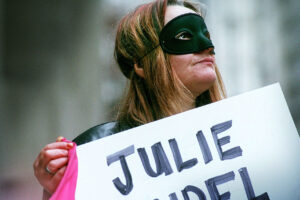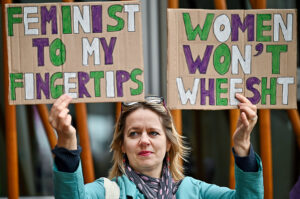What is a Terf? Initially it was used as a term of abuse. I have been on the receiving end too many times to count. “Terfs can choke on my girl dick”, “I punch Terfs” and “Dead Terfs” are a few of the charming statements which I have encountered over the years. Coined in 2008 by a person describing herself as a “cis-het woman”, the acronym stood for “trans-exclusionary radical feminist” and the trans activists embraced it enthusiastically.
Gradually, though, my feminist friends and collaborators came to embrace the word, finding it rather amusing. And responding with humour always diminishes something’s power. We would organise “Terf drinks”, and named a London restaurant we regularly meet in “Terf HQ”. On occasion, when we need to assemble over a particular issue, such as the recent Supreme Court case to decide “what is a woman’ in law, we hold Terf Nato.
For me, for my allies, Terf has come to mean something we should all take pride in: an appreciation for the truth, and for biological reality, and a concern for the safety of women and girls.
So when I spotted a four-week online course entitled: “Feminists Against Women: the Politics of Trans-Exclusionary Radical Feminism”, taught by Sophie Lewis, I found myself tempted — compelled, even — to enrol. In the blurb it promised to tell me: What is a Terf? Even more tantalising would be to discover “What makes Terfs tick?” As a proud Terf of 20 years standing, I should know. For me it’s a Negroni, the Godfather trilogy, and a decent meal in Terf HQ.
Even more exciting, I discovered, was my inclusion in the course: “we will read a spread of excerpts from the past 45 years of transphobic feminism, including Material Girls by Kathleen Stock and Feminism for Women by Julie Bindel”.
It’s not the first time I’ve been the subject of a course. My work on the global sex trade, in particular my book from 2017 on the topic, is often cited by pro-prostitution academics as a “bad take” on what they refer to as “sex work”, and I have often amused myself by reading the inaccurate guff they spout about me. But this is the first time I’ve ever signed up to participate, choosing to attend incognito.
Hosted by the Brooklyn Institute for Social Research, this is an organisation that runs such courses as “From Racial Capitalism to Prison Abolitionism” and “On the Actuarial Self, and the Crisis of Zionist Feminism”. And if that speaks to the institute’s ultra-radical leanings, Lewis herself is of a similar bent. A visiting scholar at the University of Pennsylvania, as well as a freelance writer, her forthcoming book is (predictably) billed as “an unflinching tour of enemy feminisms, from 19th-century imperial feminists and police officers to 20th-century KKK feminists and pornophobes to today’s anti-abortion and TERF feminists”.
She brought a similar energy to the course which she had convened to help people involved in the trans liberation struggle to “know the enemy”. It’s typical rhetoric for the gender wars in the US where they are fought between rabid trans activists on one side and reactionary conservatives who “know what a woman is”. Unlike here in the UK, it is rare that Left-wing feminists are heard and as a result, few points have been scored against the trans cabal. The course, presumably, was an attempt to shore up her allegedly feminist argument against us.
She certainly has form in that respect. Back in 2019 I read her essay in The New York Times, “How British Feminism Became Anti-Trans”, a hit-piece on Terfs, she has devoted plenty of time casting aspersions on me and Kathleen regarding our views on all kind of issues – but mainly gender. We had even featured her in an item on our podcast. Kathleen had discovered a piece Lewis had written about her wedding, held in a cemetery. “How do you square your advocacy for… abolition of the family,” she had written, “with your decision to marry and cohabit exclusively with a spouse?” Good question — and one the article comprehensively failed to answer.
And so I logged on to Terf school with low expectations. As for the poor dears who had to attend alongside me, they were warned they would have to contend with some tricky opinions — ones that run counter to their firmly held beliefs. Hence the obligatory trigger warning; mine and Kathleen’s work “should be considered to carry a giant content warning for transphobia — often misogynistic, specifically, transmisogynistic, generally queerphobic, and sometimes eliminationist tropes”.
Sounds exciting. But even I was unprepared for the 12 hours of turgid neo-Marxist hyperbole I was ultimately exposed to. I’d like to tell you what we were supposed to be learning about, but it was mostly incomprehensible nonsense about how Terfs are quasi-fascists, and how our ideas are based on antisemitism, colonialism, racism and every other -ism you can think of.
I was disappointed my work could be “skipped over”. Given that I feature quite prominently in both the course publicity and the reading materials, I did wonder whether she had cottoned on to the fact that I was in her virtual classroom. Nonetheless, Lewis was considerate enough to include a PDF of both mine and Kathleen’s books for students to read without having to buy them. Kath’s work was described as “crushingly evil”. Other feminists were similarly dismissed. Discussing The Transsexual Empire, a groundbreaking 1979 work by Janice Raymond — the original Terf — Lewis repeats old tropes about her supposed bigotry, even claiming Raymond hoped to annihilate the whole trans community.
Lewis also seemed unable to genuinely counter other of Raymond’s assertions, breezily suggesting she’d “never seen” trans communities use terms like “front” or “back” hole. That’s news to me: one cancer charity last year announced that “bonus hole” is an acceptable alternative to vagina, a word that can apparently “cause someone to feel hurt or distressed”. These terms have been in use as far back as 2018 in “safe sex” guides for trans identified people. It is a well-documented fact that trans activists have been bullying midwives in the UK into using “chest-feeding”, “human milk”, “strapless”, and “girl dick”. But why let a good fact get in the way of your preaching?
Just as tellingly, not everyone received such short shrift: Lewis approvingly quoted Jacob Breslow, even though he’d claimed children can be “the object of our attraction” during a 2011 pro-paedophile conference. Not to worry, though: Breslow, a former trustee of Mermaids, is still a credible Terf-busting source. In his journal article, “They Would Have Transitioned Me”, he suggests that any Terf saying that “all it takes today to get sent down the gender clinic is to be gender non-conforming” can only be secretly envious of those who did get to transition. He then uses this to target two women he is not keen on — namely Stella O’Malley and J.K. Rowling. Both women were inevitably also in Lewis’s sights over the course.
More telling, perhaps, is what the course didn’t touch on. There was not one mention of the male Terfs, such as Graham Linehan, Matt Walsh, or Simon Fanshawe. How interesting Lewis was only interested in taking out the women, the same women who have been responsible for setting up women-only services for victims and survivors of men’s violence, the ones she refers to as fascist enemies. In short, transgender ideology, including when promoted by women, is nothing short of misogyny.
The irony here is that by completely ignoring the real, tangible and positive change for women and girls that we Terfs have affected in our struggle over the years, Lewis completely fails to recognise, let alone teach, what it is that makes Terfs tick.
Disclaimer
Some of the posts we share are controversial and we do not necessarily agree with them in the whole extend. Sometimes we agree with the content or part of it but we do not agree with the narration or language. Nevertheless we find them somehow interesting, valuable and/or informative or we share them, because we strongly believe in freedom of speech, free press and journalism. We strongly encourage you to have a critical approach to all the content, do your own research and analysis to build your own opinion.
We would be glad to have your feedback.
Source: UnHerd Read the original article here: https://unherd.com/



